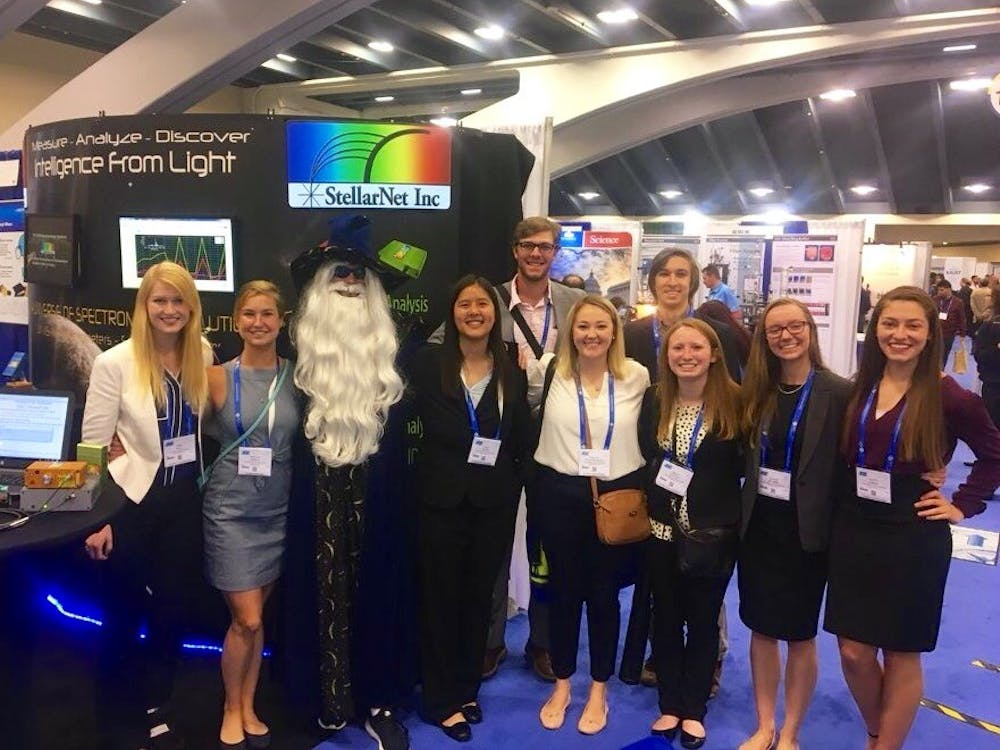On April 2, nine chemistry students from the University of Richmond traveled to San Francisco, California, for the National Meeting of the American Chemical Society (ACS).
At the conference, undergraduates from universities across the nation had the opportunity to present their research and interact with chemists, graduate school recruiters and working professionals.
The nine students were from chemistry professor Michael Leopold’s research lab. The research group studies the development of sensors that incorporate nanomaterials for biomedical applications. It monitors small molecules to find ways to quickly diagnose and treat diseases.
One of the group's main focuses is developing a uric acid sensor that would detect pregnancy-induced hypertension early on. If over-diagnosed, this condition can lead to unnecessary C-section delivery. If under-diagnosed, it can lead to a dangerous condition called preeclampsia, a pregnancy complication characterized by high blood pressure.
The lab is designing sensors for lactate and sarcosine, as well as biomarkers for sepsis and prostate cancer.
“We are trying to bring fundamental science into medicine and give our doctors faster and more effective diagnostic tools,” Leopold said.
The students' travel expenses were covered by funding from the National Science Foundation (NSF) and the university. The chemistry department received a grant to send students on trips to present research, and the dean's office matched the funds.
“The dean’s office was entrepreneurial and saw the opportunity to incentivize somebody like me, going out and getting this grant, by providing matching funds for students to go to these conferences,” Leopold said.
The national meeting of the ACS is held annually at different locations across the country. The students attended by themselves and created the research and experiments primarily by themselves.
Leopold interviews students that are interested in joining his lab.
“The real key to what we do is a long-term relationship,” Leopold said. “Not just one summer, not just one semester -- we try to develop an ongoing relationship that lasts their entire time.”
Leopold asked Helene Kerins, WC ‘17, to make proteins for her biosensors because of her experience in other labs.
Enjoy what you're reading?
Signup for our newsletter
“I’ve gotten to train a few of the younger members of the lab group in making these proteins," Kerins said. “At this point, they are very proficient and I am super comfortable with leaving and having them takeover.”
Lillian Hughes, WC ‘19, a relatively new member of Leopold's lab, attended the conference in San Francisco. She is currently training to understand the fundamentals of the research group. Her project focuses on detecting explosives, and she will be working on a black-tape wire sensor.
“Dr. Leo decided it would be good for me to see my first national conference and get practice presenting a project,” Hughes said. “A senior let me present with her.”
Hughes felt the experience was helpful and is looking forward to attending more conferences in the future and connecting with more graduate school representatives.
Other than presenting at conferences, the students co-author papers and get to see the results of their work end up in scientific journals.
“Where the textbook ends, research picks up,” Leopold said. “We have reached a level at the university that is unique country-wide. It is unusual with the number and scope that we do undergrad research, it is almost unmatched.”
Contact writer Sarah Raymond at sarah.raymond@richmond.edu
Support independent student media
You can make a tax-deductible donation by clicking the button below, which takes you to our secure PayPal account. The page is set up to receive contributions in whatever amount you designate. We look forward to using the money we raise to further our mission of providing honest and accurate information to students, faculty, staff, alumni and others in the general public.
Donate Now



